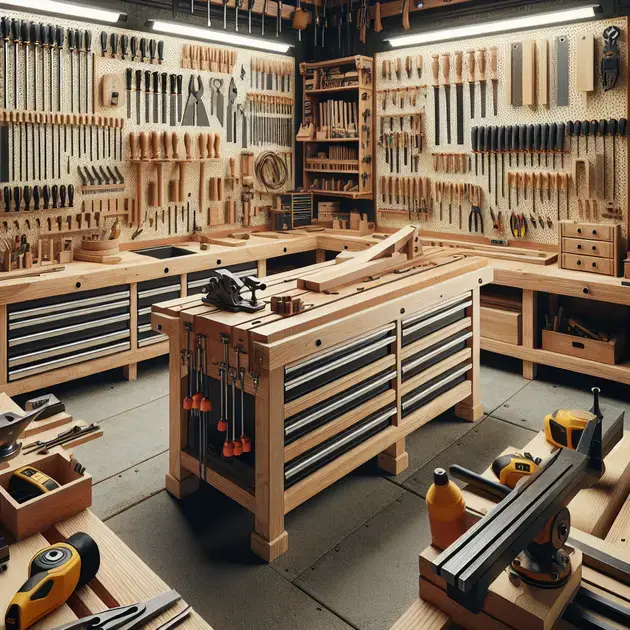Are you ready to transform your woodworking hobby into a fully equipped woodworking shop? In this comprehensive guide, we will walk you through everything you need to know about setting up the ultimate woodworking shop. From selecting the right tools to optimizing workspace layout, we’ve got you covered.
With the rise of online woodworking communities and resources, there has never been a better time to build your dream woodworking shop. By following the steps outlined in this guide, you’ll be well on your way to creating a space where you can unleash your creativity and bring your woodworking projects to life.

Setting Up Your Woodworking Shop: A Beginner’s Guide
Introduction
When setting up your woodworking shop as a beginner, it’s essential to start with a clear plan in mind. Begin by allocating a dedicated space for your shop, ensuring you have enough room for your tools, materials, and projects. Consider factors such as lighting, ventilation, and electrical outlets to create a comfortable and functional workspace. Research online resources such as the Wood Magazine website for comprehensive guides on setting up a woodworking shop for beginners.
Choosing the Right Tools
Selecting the essential tools for your woodworking shop is crucial for a successful start. Invest in high-quality basics such as a table saw, drill press, and hand tools like chisels and planes. Websites like Fine Woodworking offer reviews and recommendations for beginner woodworkers, helping you make informed decisions when purchasing tools. Look for second-hand options on platforms like eBay or Craigslist to save money while building your tool collection.
Organizing Your Workspace
Organizing your woodworking shop efficiently is key to maximizing productivity and minimizing clutter. Utilize wall-mounted storage solutions for tools and materials, such as pegboards and shelves. Create designated areas for different woodworking tasks, like cutting, sanding, and assembly. Visit the Popular Woodworking website for articles on workshop organization to optimize your space and workflow effectively.
Safety Measures
Prioritize safety in your woodworking shop by investing in essential safety gear such as goggles, ear protection, and dust masks. Familiarize yourself with the proper usage of each tool and follow safety guidelines when operating machinery. Online platforms like Woodcraft provide tutorials on woodworking safety practices, ensuring a secure working environment for beginners. Implement safety protocols and procedures to prevent accidents and injuries in your shop.
Getting Started on Projects
Once your woodworking shop is set up and organized, it’s time to start working on projects. Begin with simple projects like a cutting board or a basic shelf to practice your woodworking skills. Follow step-by-step tutorials from woodworking blogs like The Wood Whisperer for guidance on beginner projects. Join online woodworking communities like WoodNet to share your work, seek advice, and connect with fellow woodworkers as you progress in your craft.
Essential Tools for Your Woodworking Shop
Choosing the Right Power Tools
Investing in essential power tools for your woodworking shop is crucial for efficiency and precision in your projects. Start with a reliable table saw for accurate cuts, a drill press for drilling holes, and a jigsaw for curved cuts. Platforms like Woodworker’s Journal offer tool reviews and recommendations to help you select the best options for your shop. Consider purchasing tools from reputable brands like DeWalt or Bosch for durability and performance.
Hand Tools for Precision Work
In addition to power tools, hand tools are vital for fine woodworking and detail-oriented tasks. Include essentials such as chisels, hand planes, and marking gauges in your collection. Explore tutorials on woodworking websites like Woodworkers Guild of America for guidance on using hand tools effectively. Consider sharpening your hand tools regularly using sharpening stones or systems recommended by woodworking experts to maintain their cutting edge.
Measuring and Marking Tools
Accurate measurements are essential in woodworking to ensure precise cuts and assemblies. Invest in measuring tools like a combination square, tape measure, and calipers for accurate dimensions. Websites like Woodsmith Shop provide tutorials on proper measuring and marking techniques for woodworking projects. Utilize layout tools such as marking knives and marking gauges to transfer measurements and create clean, accurate joints in your woodworking projects.
Tool Storage Solutions
Organizing your tools effectively is critical for a well-functioning woodworking shop. Use tool chests, cabinets, and tool racks to keep your tools organized and easily accessible. Explore DIY plans for tool storage on woodworking forums like Sawdust Girl to create custom storage solutions for your shop. Consider labeling drawers and compartments for efficient tool retrieval and storage. Implement a tool maintenance routine to keep your tools in optimal condition for long-term use.
Specialized Tools for Advanced Projects
As you advance in your woodworking skills, consider adding specialized tools to your collection for complex projects. Invest in tools like a router for decorative edges, a planer for smoothing rough lumber, and a bandsaw for intricate cuts. Research online resources such as Woodworker’s Source for in-depth guides on using specialized woodworking tools. Attend workshops or classes to learn advanced techniques and expand your skills with these specialized tools.
Maximizing Space in Your Woodworking Shop
Utilizing Vertical Storage
Make the most of your woodworking shop space by utilizing vertical storage solutions. Install wall-mounted shelves, cabinets, and pegboards to store tools, materials, and supplies off the floor. Hang frequently used tools within easy reach for quick access during projects. Websites like Woodworkers Source offer tips on maximizing vertical storage in small workshop spaces for efficient organization.
Mobile Workstations and Tool Carts
Create flexible workstations in your woodworking shop with mobile tool carts and workbenches. Design portable work surfaces with built-in storage for tools and accessories, allowing you to move them around the shop as needed. Explore DIY plans for mobile workstations on woodworking blogs like The Family Handyman for customizable solutions. Incorporate locking casters on your tool carts for stability during use and easy mobility around your workshop.
Optimizing Layout for Workflow
Design an efficient layout in your woodworking shop to streamline your workflow and maximize productivity. Arrange workstations in a logical sequence, starting from rough cutting to final assembly. Consider the flow of materials and tools within your workspace to minimize unnecessary movements. Websites like The Spruce Crafts provide tips on optimizing workshop layouts for different woodworking processes. Experiment with different layouts to find the most ergonomic and functional setup for your shop.
Multipurpose Workstations and Tools
Maximize space in your woodworking shop by incorporating multipurpose workstations and tools. Invest in versatile tools that can perform multiple functions, such as combination router tables or flip-top workbenches. Explore woodworking magazines like Woodworker’s Journal for reviews and tutorials on multipurpose tools for small shop spaces. Create dual-purpose workstations that can serve as assembly tables or tool storage units to optimize your shop’s functionality without overcrowding the space.
Implementing Modular Storage Systems
Optimize storage in your woodworking shop with modular shelving and cabinet systems that can be reconfigured as needed. Use adjustable shelves and storage bins to accommodate varying sizes of tools and materials. Research modular storage solutions on woodworking websites like Woodworking Network for innovative ideas on maximizing space efficiency. Customize your storage systems to fit specific tools and equipment, allowing for easy access and organization in your woodworking shop.

Tools Every Woodworking Shop Needs
When setting up a woodworking shop, it’s crucial to ensure you have the right tools to tackle any project that comes your way. Here are some essential tools that every woodworking shop should have:
1. Circular Saw
A circular saw is a versatile tool that can make quick and precise cuts in various materials. Whether you’re cutting lumber for a basic DIY project or slicing through hardwood for a furniture piece, a circular saw is a must-have in any woodworking shop.
2. Clamps
Clamps are essential for holding pieces of wood together securely while glue dries or when you’re working on intricate joinery. Having a variety of clamps in different sizes and styles will ensure you have the right tool for any situation.
3. Wood Chisels
Wood chisels are indispensable for carving out intricate details, cleaning up joints, and shaping wood with precision. Invest in a set of high-quality wood chisels to ensure you can achieve professional results in your woodworking projects.
4. Random Orbit Sander
A random orbit sander is perfect for smoothing out rough surfaces, removing old finishes, and preparing wood for staining or painting. With its versatile sanding capabilities, a random orbit sander is a must for any woodworking shop.
5. Measuring Tools
Precision is key in woodworking, so having a selection of accurate measuring tools such as a tape measure, combination square, and calipers is essential. These tools will help you ensure that your cuts are precise and your projects are perfectly aligned.
Organizing Your Woodworking Shop Efficiently
Efficient organization is key to maximizing productivity and minimizing frustration in your woodworking shop. Here are some tips to help you organize your space effectively:
1. Designate Zones
Divide your woodworking shop into distinct zones for different tasks, such as cutting, assembly, finishing, and storage. This will help you work more efficiently by having all the necessary tools and materials close at hand in each zone.
2. Utilize Vertical Storage
Make the most of your space by installing shelves, pegboards, and cabinets for vertical storage of tools and supplies. This will free up valuable floor space and keep your shop tidy and organized.
3. Label Everything
Keep track of your tools and materials by labeling shelves, bins, and drawers. This will make it easy to find what you need quickly and ensure that everything has its proper place.
4. Invest in Workbenches
A sturdy workbench is a valuable addition to any woodworking shop, providing a solid surface for cutting, assembling, and finishing projects. Consider having multiple workbenches for different tasks to improve workflow.
5. Regularly Declutter
Take the time to declutter your woodworking shop regularly by getting rid of any tools, materials, or equipment that you no longer use. This will help you maintain a clean and organized workspace, making it easier to focus on your projects.
Safety Tips for Your Woodworking Shop
Woodworking can be a rewarding but potentially hazardous activity if proper safety precautions are not taken. Here are some essential safety tips to keep in mind in your woodworking shop:
1. Wear Personal Protective Equipment (PPE)
Always wear appropriate PPE, including safety glasses, hearing protection, and a dust mask, to protect yourself from flying debris, loud noises, and harmful dust particles generated during woodworking tasks.
2. Use Tools Properly
Take the time to familiarize yourself with each tool’s proper operation and safety features before using it. Always follow the manufacturer’s instructions and guidelines to prevent accidents and injuries.
3. Maintain a Clean Workspace
Keep your woodworking shop clean and organized to avoid tripping hazards and unnecessary clutter. A tidy workspace not only improves safety but also enhances efficiency and focus during woodworking projects.
4. Avoid Distractions
Focus on the task at hand and avoid distractions while operating power tools or handling sharp objects. Stay alert and attentive to prevent accidents and ensure your safety in the woodworking shop.
5. Educate Yourself
Continuously educate yourself on woodworking safety practices and techniques to enhance your skills and minimize the risk of accidents. Attend workshops, read safety manuals, and stay informed about best practices in woodworking safety.
Conclusion
In conclusion, setting up a woodworking shop requires essential tools like a circular saw, clamps, wood chisels, random orbit sander, and measuring tools for precision. Efficient organization through designated zones, vertical storage, labeling, workbenches, and regular decluttering is crucial for maximizing productivity. Additionally, following safety tips such as wearing PPE, using tools properly, maintaining a clean workspace, avoiding distractions, and continuous education ensures a safe and rewarding woodworking experience. By equipping your shop with the right tools, organizing efficiently, and prioritizing safety, you can create a productive and secure woodworking environment for all your projects.